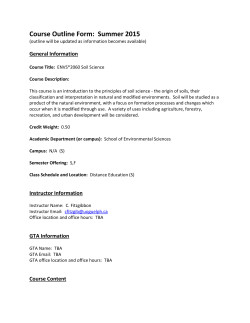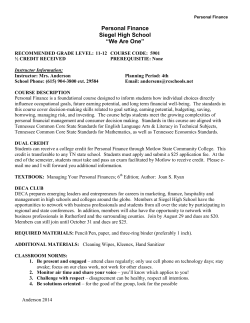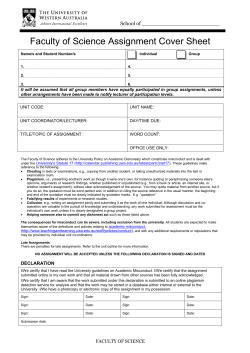
MCB*6360 - University of Guelph
DEPARTMENT OF MOLECULAR AND CELLULAR BIOLOGY UNIVERSITY OF GUELPH MCB*6360 ADVANCED TOPICS IN BIOCHEMISTRY AND MOLECULAR BIOLOGY Winter 2015, 0.5 credits Course Information A study of selected contemporary topics in biochemistry and molecular biology. Proposed course descriptions are considered by the Department of Molecular and Cellular Biology on an ad hoc basis, and the course will be offered according to demand. In Winter 2015, the overall topic for the MCB*6360 will emphasize Advanced Spectroscopy: Theory and Practice. The course will be presented in 3 modules, each featuring the expertise of one of the instructors. LECTURES Tuesdays, 2:00 – 5:00 pm in SCIE 3317 Instructors Module 1: Dr. John Dawson Science Complex Room 2248 Office hours: Wed 9:30 – 11:00 am January 6 – 27 Email: jdawso01@uoguelph.ca Module 2: Dr. Steffen Graether Science Complex Room 2255 Office hours: Tue 10:30 – 11:30 am Thu 1:30 – 2:30 pm Other times are available by appointment February 3 – March 3 Email: graether@uoguelph.ca Module 3: Dr. Rod Merrill Science Complex Room 2250 Office hours: Wed 1:30 – 3:30 pm March 10 – 31 Email: rmerrill@uoguelph.ca 1 GRADE ASSESSMENT Form of Assessment Module 1 Value Due Date of Assessment Course Content /Activity 30% Week 1 Data Management Plan 5% Jan 13, 2:30 pm Short paper Week 1 Mendeley Assignment 3% Jan 13, 2:30 pm 3 formatted texts Week 2 Spectrophotometer Assignment 5% Jan 20, 2:30 pm Short paper Week 3 Principles of Protein Polymers 7% Jan 27, 2:30 pm Short paper Week 4 Modeling and Analysis of Polymerization Data 10% Feb 3, 2:30 pm Data analysis results Module 2 30% Week 8 Protein-protein docking exercise 15% Mar 3, 2:00 pm 20 min oral presentation Week 9 Analysis of binding data 15% Mar 10, 5:00 pm 5 page written report Module 3 30% Weeks 11 - 12 Fluorescence Methods in Biochemistry 20% Mar 17, 25 30 min oral presentation Weeks 11 - 12 Critical Analysis of Research papers 10% Mar 17, 25 Lead group discussion on critique of paper Class Participation See below 10% Submit all assignments in your Dropbox on Courselink by the deadline indicated. Feedback and grades will be uploaded to your dropbox. Class Participation The assessment for class participation includes your engagement with the material and your fellow classmates, demonstrated leadership and independence, and involvement in questioning in class. 2 Standard University Course Policies E-mail Communication: As per university regulations, all students are required to check their <uoguelph.ca> email account regularly: e-mail is the official route of communication between the University and its students. When You Cannot Meet a Course Requirement: When you find yourself unable to meet an in- course requirement because of illness or compassionate reasons, please advise the course instructor (or designated person, such as a teaching assistant) in writing, with your name, id#, and e-mail contact. See the graduate calendar for information on regulations and procedures for Academic Consideration: Graduate Calendar - Academic Consideration Drop Date: The last date to drop one-semester courses, without academic penalty, is the 40th class day (March 6th, 2015). See the schedule of dates in the Graduate Calendar. For regulations and procedures for Dropping Courses, see the Graduate Calendar: Graduate Calendar - Dropping Courses Accessibility: The University of Guelph is committed to creating a barrier-free environment. Providing services for students is a shared responsibility among students, faculty and administrators. This relationship is based on respect of individual rights, the dignity of the individual and the University community's shared commitment to an open and supportive learning environment. Students requiring service or accommodation, whether due to an identified, ongoing disability or a short-term disability should contact Student Accessibility Services (SAS) as soon as possible. For more information, contact SAS at 519-824-4120 ext. 56208 or email csd@uoguelph.ca or see the website: Student Accessibility Services (SAS) Academic Misconduct: The University of Guelph is committed to upholding the highest standards of academic integrity and it is the responsibility of all members of the University community – faculty, staff, and students – to be aware of what constitutes academic misconduct and to do as much as possible to prevent academic offences from occurring. University of Guelph students have the responsibility of abiding by the University's policy on academic misconduct regardless of their location of study; faculty, staff and students have the responsibility of supporting an environment that discourages misconduct. Students need to remain aware that instructors have access to and the right to use electronic and other means of detection. Please note: Whether or not a student intended to commit academic misconduct is not relevant for a finding of guilt. Hurried or careless submission of assignments does not excuse students from responsibility for verifying the academic integrity of their work before submitting it. Students who are in any doubt as to whether an action on their part could be construed as an academic offence should consult with a faculty member or faculty advisor. The Academic Misconduct Policy is detailed in the Graduate Calendar: Graduate Calendar - Academic 3 Misconduct Recording of Materials: Presentations which are made in relation to course work—including lectures—cannot be recorded or copied without the permission of the presenter, whether the instructor, a classmate or guest lecturer. Material recorded with permission is restricted to use for that course unless further permission is granted. Resources: The Academic Calendars are the source of information about the University of Guelph’s procedures, policies and regulations which apply to undergraduate, graduate and diploma programs: Academic Calendars Statement on the use of animals: No animals are used directly in the laboratory exercises for BIOC*2580. However it is in the nature of biochemistry that some enzymes or biochemical substances may be derived from animal sources. Efforts have been made to reduce the use of animal related products by using equivalent enzymes or substances derived from microbial or plant sources, but in some cases it may be necessary to use these products. 4
© Copyright 2025














